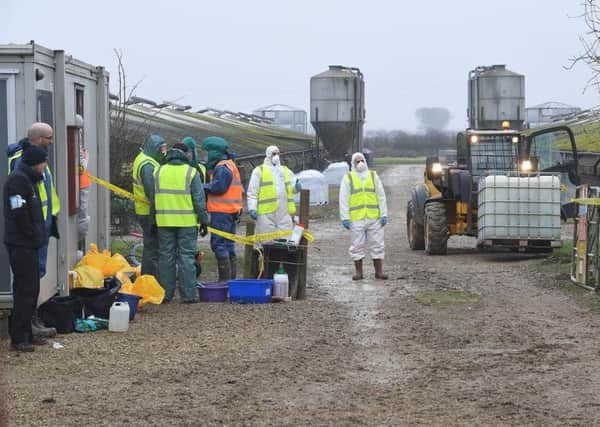PICTURE AND VIDEO UPDATE: Officials on scene at outbreak of bird flu in Frithville


The farm, which has not been named but has been confirmed to be located on Hales Lane, in Frithville, is set to see more than 19,500 of its birds culled after the UK’s Chief Veterinary Officer yesterday (Thursday) confirmed the avian flu.
The flock is estimated to contain approximately 19,500 birds.
Advertisement
Hide AdAdvertisement
Hide AdA 3km Protection Zone and a 10km Surveillance Zone have been put in place around the infected premises to limit the risk of the disease spreading and investigate the source of the infection.
The Department for Environment, Food and Rural Affairs says a number have died and the remaining live birds at the premises will be humanely culled.
A full investigation is under way to determine the source of the infection.
It has been confirmed as H5N8 avian flu.
Public Health England advise that the risk to public health from the virus is very low and the Food Standards Agency is clear that bird flu does not pose a food safety risk for UK consumers.


Advertisement
Hide AdAdvertisement
Hide AdChief Veterinary Officer Nigel Gibbens said: “The Government has taken swift action to limit the spread of the disease, with restrictions around affected premises and wider measures in place across the country.
“To reduce the risk of bird flu spreading from bird to bird there is currently a legal requirement for all poultry keepers – even those who just keep a few birds as pets – to keep their birds housed or otherwise separate from wild birds. There is also a ban on poultry gatherings.
“Bird flu is also transmitted via the environment, for example in wild bird droppings, and it is vital that keepers practice strict biosecurity. This means taking precautions such as putting up netting, keeping food and water inside and disinfecting footwear and equipment after contact with birds.”
The video above includes a short video plus pictures of the site.


Advertisement
Hide AdAdvertisement
Hide AdThis latest outbreak follows two others recently near Louth one of which is still in place, the other has had its restrictions lifted.
So far this year the virus has been confirmed at a commercial game farm in Lancashire, at three separate poultry farms in Lincolnshire and in backyard flocks in North Yorkshire and Carmarthenshire.
According to the DEFRA website restrictions remain in place at today’s Frithville Farm, a location in Wyre, Lancashire (confirmed on January 24), East Lindsey, Lincolnshire (confirmed January 16), Settle, North Yorkshire (confirmed January 6) and Carmarthenshire, Wales (confirmed January 4).
One of the sites near Louth, which was confirmed on December 16, had all its restrictions lifted on January 18.
Advertisement
Hide AdAdvertisement
Hide AdDEFRA says the the same strain has also been found in wild birds in England, Scotland and Wales and has been circulating in wild birds in Europe for several months.
The advice from DEFRA for those who keep poultry or captive birds is as follows:
l If you keep poultry you are equired by law to house them or otherwise keep them separate from wild birds. A Prevention Zone is currently in force across the UK until February 28, 2017.
l Reduce the risk of infection by practising good biosecurity – even if your birds are inside.
Advertisement
Hide AdAdvertisement
Hide Adl Gatherings of poultry across the UK are currently banned – including chickens, turkeys, ducks and geese, and restricting events such as livestock fairs, auctions and bird shows.
l Reporting suspicion of disease in your poultry by calling the Defra Rural Services Helpline on 03000 200 301.
l Reporting dead wild birds - such as swans, geese, ducks, gulls or birds of prey - to the Defra helpline on 03459 33 55 77.